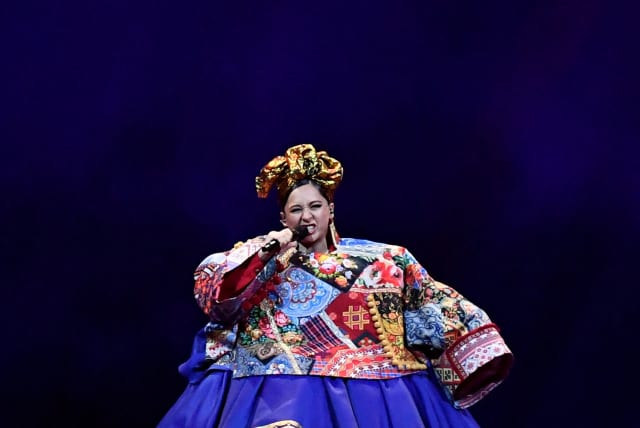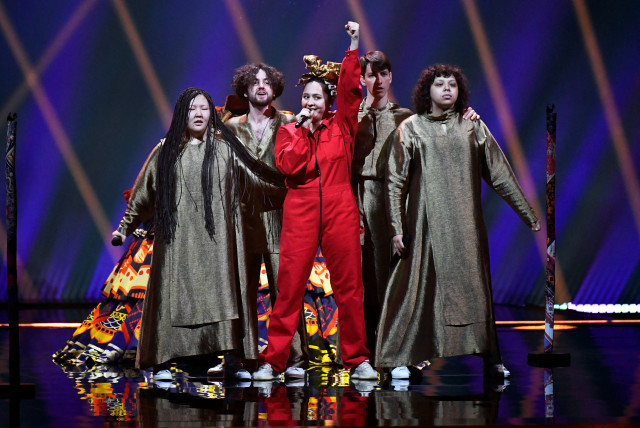Russia's last Eurovision singer seeks to spread hope

The singer, whose music has since been banned in her home country, speaks out against war.
The last singer to represent Russia at the Eurovision Song Contest before it was banned, now herself ostracized at home, hopes that a new track released on the eve of this year's final will give others the strength to speak their truth.
Russian-Tajik singer-songwriter Manizha said "Candlelight" was partly a response to having her concerts canceled and being abused online after she voiced opposition to Russia's war in Ukraine - the cause of its exclusion from Eurovision in 2022.
When President Vladimir Putin first ordered troops into Ukraine, the singer, full name Manizha Sangin, called the conflict "fratricide" and said it was being waged "against my will, against the will of my family, and, I believe, against the will of our peoples."
Singer blacklisted due to war opposition
The goodwill ambassador for the U.N. Refugee Agency UNHCR says she now cannot perform live in Russia and that her music is banned in public places. Reports by independent Russian media say she is on a blacklist, although it has not been officially confirmed.
In a video interview from Russia in English, the 32-year-old told Reuters she had written "Candlelight," released on Wednesday, partly "to remind myself that I have to remember who I (was) before (the) war, who I (was) before this hate campaign."
"It's important to think about it, to remind ourselves," she said. "My wish is ... maybe to inspire people (who) go through all of those circumstances."
Since the war began, new Russian laws have made public opposition to it punishable by stiff fines or even jail.
"Even if your hands are tied, no one can shut your mind," Manizha sings on the track, the first single of her upcoming extended play "Hope."
Campaigner for LGBT rights
She has also campaigned against domestic violence and for LGBT rights, putting her squarely at odds with the social conservatism that increasingly shapes Putin's ideology when she was picked to represent Russia at Eurovision in 2021.
She came ninth with the song "Russian Woman," which urged women to empower themselves and took aim at social pressures to beautify themselves, find a man or have children.
Recently the popular Russian news outlet Mash has reported a complaint accusing her of "justifying terrorism," though investigators have not announced any charges.
After gunmen killed more than 140 people at a concert hall near Moscow in March in an attack claimed by the militant group Islamic State, about a dozen mostly Tajik suspects were arrested and several have been seen being abused by interrogators in videos posted to social media.
Manizha moved from Tajikistan to Moscow with her parents aged 4. In a video on Instagram, she condemned the "bestiality" of the attack but said it had been met by "public torture" and that she feared reprisals against Tajiks and other central Asians.
With no prospect for now of being able to perform at home, she takes strength from the success of her concerts outside Russia, and the memories of her appearance at Eurovision.
"(The) whole experience on Eurovision was beautiful," she said. "I wish that someday I will come back on that stage ... just to feel that love again."
Jerusalem Post Store
`; document.getElementById("linkPremium").innerHTML = cont; var divWithLink = document.getElementById("premium-link"); if (divWithLink !== null && divWithLink !== 'undefined') { divWithLink.style.border = "solid 1px #cb0f3e"; divWithLink.style.textAlign = "center"; divWithLink.style.marginBottom = "15px"; divWithLink.style.marginTop = "15px"; divWithLink.style.width = "100%"; divWithLink.style.backgroundColor = "#122952"; divWithLink.style.color = "#ffffff"; divWithLink.style.lineHeight = "1.5"; } } (function (v, i) { });

